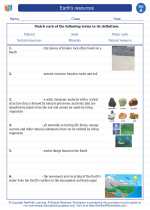Atoms
An atom is the smallest unit of matter that represents a chemical element. It consists of a nucleus, which contains protons and neutrons, and electrons that orbit the nucleus. Atoms are the building blocks of all matter and are crucial to understanding the composition of the universe.
Structure of an Atom
The nucleus of an atom contains positively charged protons and neutral neutrons. The electrons, which are negatively charged, orbit the nucleus in energy levels or shells. The number of protons in the nucleus determines the element's identity, while the number of electrons determines its chemical properties.
Subatomic Particles
- Protons: Positively charged particles located in the nucleus.
- Neutrons: Neutral particles located in the nucleus.
- Electrons: Negatively charged particles that orbit the nucleus in specific energy levels.
Atomic Number and Mass Number
The atomic number of an element is equal to the number of protons in its nucleus. The mass number is the sum of the protons and neutrons in the nucleus.
Study Guide
Here are some key points to remember when studying atoms:
- What are the three subatomic particles and where are they located in the atom?
- Explain the concept of atomic number and mass number.
- Draw a simple diagram of an atom, labeling the nucleus, protons, neutrons, and electrons.
- Understand the role of electrons in determining the chemical properties of an element.
- Research the history of atomic theory and the contributions of scientists such as Democritus, Dalton, Thomson, Rutherford, and Bohr.
Understanding atoms is fundamental to comprehending the behavior and interactions of matter. Feel free to explore further concepts such as isotopes, electron configuration, and the periodic table to deepen your knowledge of atoms and the elements they compose.
[Atoms] Related Worksheets and Study Guides:
.◂Science Worksheets and Study Guides First Grade. Earth's resources
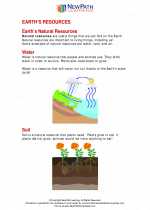
 Worksheet/Answer key
Worksheet/Answer key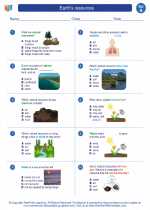
 Worksheet/Answer key
Worksheet/Answer key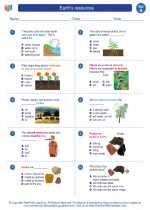
 Worksheet/Answer key
Worksheet/Answer key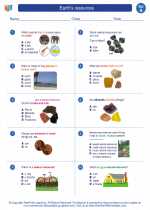
 Vocabulary/Answer key
Vocabulary/Answer key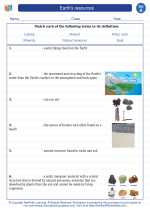
 Vocabulary/Answer key
Vocabulary/Answer key